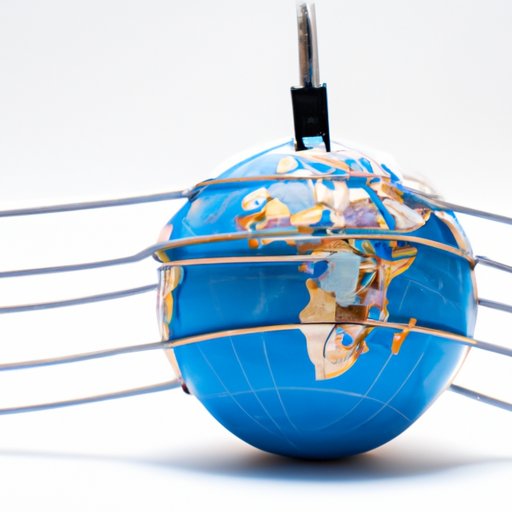I. Introduction
Protectionism has become a recurring topic in global politics in recent years. With the rise of economic nationalism and concerns about international trade, it is becoming increasingly important to understand what protectionism is, its goals, and its impact on global economies. This article will explore the ins and outs of protectionism, from its basic definitions to its role in shaping international relations. In doing so, this article aims to provide a comprehensive guide for both economists and laypeople alike.
II. Demystifying Protectionism: Understanding the Basics and the Arguments For and Against It
Protectionism refers to a range of policies that aim to restrict trade with other countries to protect domestic industries. These policies include tariffs, quotas, and subsidies. The main goal of protectionism is to create an economic environment that supports domestic industries and workers, often by shielding them from international competition.
Proponents of protectionism argue that it can boost domestic industries, preserve jobs, and protect national security. However, opponents argue that protectionism can lead to a loss of economic efficiency, reduce innovation, and lead to higher prices for consumers. Ultimately, protectionism differs from free trade in that it prioritizes domestic industries at the expense of international trade.
III. The Pros and Cons of Protectionism: A Comprehensive Guide for Economists and Laypeople Alike
The economic impacts of protectionism are complex and multifaceted. On the one hand, protectionist policies can help domestic industries by limiting foreign competition, which can lead to job creation and economic growth. On the other hand, protectionism can lead to higher prices for consumers, inefficiencies in production, and a reduction in innovation.
The potential impact of protectionism on businesses and consumers cannot be understated. For instance, tariffs can make imported goods more expensive, affecting businesses that rely on international supply chains and increase costs for consumers. Protectionist policies can also lead to retaliatory measures from other countries, which can harm domestic industries and lead to a broader trade war.
To understand the effects of protectionism on the global economy, it is helpful to examine case studies of countries that have implemented protectionist policies. For example, in the late 19th century, the United States implemented a series of protectionist policies aimed at promoting domestic industries. The policies were initially successful in creating jobs and boosting the economy, but they also led to higher prices for consumers and reduced innovation.
IV. Tariffs, Trade Agreements, and Economic Nationalism: How Protectionism Shapes Global Politics
Protectionism has played a significant role in shaping international relations, particularly in the context of trade agreements and tariffs. Tariffs are taxes on imported goods, and they are often used as a tool to protect domestic industries from foreign competition. However, tariffs can also lead to retaliatory measures and trade wars between countries.
Trade agreements, such as the North American Free Trade Agreement (NAFTA), have also become a contentious issue in recent years. Proponents of these agreements argue that they promote economic efficiency and open markets. However, opponents argue that they can lead to job losses and the outsourcing of jobs to other countries.
The rise of economic nationalism, particularly in countries like the United States and China, has also contributed to the growing prominence of protectionism. Economic nationalism prioritizes domestic interests over international trade, and it often involves the use of protectionist policies to support domestic industries. The impact of economic nationalism on global trade and international relations remains an open question.
V. A Historical Overview of Protectionism: from Alexander Hamilton to Donald Trump
Protectionism has a long and complex history, stretching back centuries. One of the earliest advocates of protectionism was Alexander Hamilton, one of the founding fathers of the United States. Hamilton believed that protectionist policies were necessary to promote economic growth and protect domestic industries.
In more recent times, protectionism has become a prominent political issue in the United States, particularly under the current administration of President Donald Trump. Trump has implemented a range of protectionist policies, including tariffs on Chinese goods and the renegotiation of trade agreements like NAFTA. These policies have been controversial and have led to concerns about the impact of protectionism on the global economy.
VI. Protectionism in the Age of Globalization: Can We Find a Middle Ground Between Protection and Free Trade?
Balancing protectionism with free trade is a complex issue, and finding a middle ground is challenging. One potential solution is to focus on creating fair trade policies that promote economic efficiency without sacrificing domestic interests. This could involve negotiating trade agreements that take into account the needs of all parties involved, rather than prioritizing one country or industry over another.
Another potential solution is to provide targeted support for domestic industries that are struggling to compete on a global level. This could involve investing in research and development, providing subsidies, or creating other forms of support aimed at promoting domestic industries.
The potential consequences of a protectionist shift on global economies cannot be understated. If protectionist policies continue to gain ground, it could lead to increased trade barriers, economic inefficiencies, and a broader economic slowdown. Policymakers must carefully consider the impact of protectionism on the global economy when making decisions about international trade and domestic policies.
VII. Conclusion
In conclusion, protectionism is a complex and evolving issue that has significant implications for global economics and international relations. While there are arguments for and against protectionism, it is clear that finding a middle ground between protection and free trade is essential. Policymakers must carefully consider the impacts of protectionist policies on both domestic industries and the global economy when making decisions about trade and economic policy.
